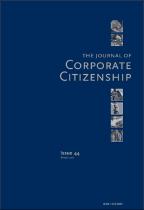JavaScript is disabled for your browser. Some features of this site may not work without it.
- ResearchSpace
- →
- Research Publications/Outputs
- →
- Journal Articles
- →
- View Item
| dc.contributor.author |
Mzenda, Venantio M

|
|
| dc.contributor.author |
De Jongh, D

|
|
| dc.date.accessioned | 2013-02-14T05:43:31Z | |
| dc.date.available | 2013-02-14T05:43:31Z | |
| dc.date.issued | 2012-07 | |
| dc.identifier.citation | Mzenda, V and De Jongh, D. 2012. Climate change governance in the South African mining sector. Journal of Corporate Citizenship, vol. 44, pp. 45-67 | en_US |
| dc.identifier.issn | 1470-5001 | |
| dc.identifier.uri | http://www.qscience.com/doi/abs/10.5339/gse-collection.cop18.12@cop18.2012.2012.issue-1 | |
| dc.identifier.uri | http://hdl.handle.net/10204/6551 | |
| dc.description | Published under a Creative Commons 3.0 CC-BY licence. Unrestricted use, distribution and reproduction in any medium is permitted, provided the article is properly cited. | en_US |
| dc.description.abstract | A high carbon footprint attributed to coal-based electricity; low value-added in mineral exports; regional isolation from its key trading partners; low levels of technological innovation; low levels of climate change mitigation efforts; and low value-added in its exports: all these expose the South African mining sector to climate change-related business risks. This study explores corporate governance as a vehicle through which South Africa’s mining companies could improve their response to climate change. In this study, discussions of climate change at board level, the existence of climate change strategy, communications on climate change and initiatives to mitigate climate change are considered proxies for corporate performance on climate change. Furthermore, corporate governance mechanisms and practices, the role of company executives and that of the board are regarded as central determinants to corporate performance on climate change. Research findings from a sample of 12 mining companies indicate the sector’s vulnerability to climate change business risks. The study results showed that South Africa’s mining companies in general do not regard ‘product’, ‘competition’, ‘technological’ and ‘consumer activism’ as significant forms of climate change business risks. The assessment showed that, on average, South African mining companies need to improve their climate change corporate governance. | en_US |
| dc.language.iso | en | en_US |
| dc.publisher | Greenleaf Publishing | en_US |
| dc.relation.ispartofseries | Workflow;10094 | |
| dc.subject | Climate change governance | en_US |
| dc.subject | South African climate change governance | en_US |
| dc.subject | South African mining industry | en_US |
| dc.subject | Mining risks | en_US |
| dc.title | Climate change governance in the South African mining sector | en_US |
| dc.type | Article | en_US |
| dc.identifier.apacitation | Mzenda, V. M., & De Jongh, D. (2012). Climate change governance in the South African mining sector. http://hdl.handle.net/10204/6551 | en_ZA |
| dc.identifier.chicagocitation | Mzenda, Venantio M, and D De Jongh "Climate change governance in the South African mining sector." (2012) http://hdl.handle.net/10204/6551 | en_ZA |
| dc.identifier.vancouvercitation | Mzenda VM, De Jongh D. Climate change governance in the South African mining sector. 2012; http://hdl.handle.net/10204/6551. | en_ZA |
| dc.identifier.ris | TY - Article AU - Mzenda, Venantio M AU - De Jongh, D AB - A high carbon footprint attributed to coal-based electricity; low value-added in mineral exports; regional isolation from its key trading partners; low levels of technological innovation; low levels of climate change mitigation efforts; and low value-added in its exports: all these expose the South African mining sector to climate change-related business risks. This study explores corporate governance as a vehicle through which South Africa’s mining companies could improve their response to climate change. In this study, discussions of climate change at board level, the existence of climate change strategy, communications on climate change and initiatives to mitigate climate change are considered proxies for corporate performance on climate change. Furthermore, corporate governance mechanisms and practices, the role of company executives and that of the board are regarded as central determinants to corporate performance on climate change. Research findings from a sample of 12 mining companies indicate the sector’s vulnerability to climate change business risks. The study results showed that South Africa’s mining companies in general do not regard ‘product’, ‘competition’, ‘technological’ and ‘consumer activism’ as significant forms of climate change business risks. The assessment showed that, on average, South African mining companies need to improve their climate change corporate governance. DA - 2012-07 DB - ResearchSpace DP - CSIR KW - Climate change governance KW - South African climate change governance KW - South African mining industry KW - Mining risks LK - https://researchspace.csir.co.za PY - 2012 SM - 1470-5001 T1 - Climate change governance in the South African mining sector TI - Climate change governance in the South African mining sector UR - http://hdl.handle.net/10204/6551 ER - | en_ZA |






